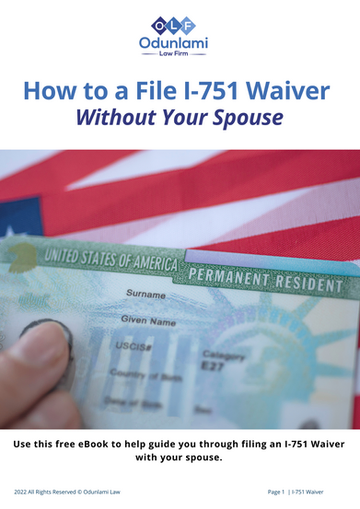If you are in a difficult situation, in which you are a conditional green card holder, with an expiring green card, and your marriage is ending because of divorce, death, or abuse. You are able to file a waiver to remove your conditions and apply for a permanent resident green card.
What is an I-751 Waiver?
An I-751 Waiver allows an immigrant with a (two-year) conditional green card to file an I-751 petition by themselves without the support of a spouse and to remove the conditions on their conditional permanent residence status. If approved, an immigrant will be granted a (ten-year) permanent resident green card.
How do I qualify for an I-751 Waiver?
You must file for an I-751 Waiver 90-days before your conditional green card expires
The marriage was a marriage of good faith, but the marriage ended or is ending in divorce and the spouse is a United States citizen
The marriage was a marriage of good faith, but the marriage ended through the death of a spouse who was a United States citizen
The marriage was a marriage of good faith but during the marriage, you experienced extreme physical or mental cruelty by your United States citizen spouse.
The termination of my green card status and removal from the United States would result in extreme hardship.
What are the steps to file an I-751 Waiver?
Along with filing the I-751 Waiver, you need to also submit the following documents, if applicable, along with your filing fee.
A copy of both sides of your conditional green cards
Copies of your divorce documents, or documents to prove divorce filings
Evidence to prove your marriage was of good faith
Other evidence and documents (death certificate or abuse) to prove the end of your marriage
Evidence of abuse or extreme cruelty
Filing fee
How to prove a marriage of “good faith”
Proving that your marriage was of “good faith” is the most important part of this filing. You must prove that you both entered the marriage in good faith and not just to receive immigration benefits. Here are some examples of documents you should gather to prove your marriage was of good faith
Correspondence between each other – this includes cards, letters, emails, text message
Wedding photo and/or photos of moments celebrating events
Tax returns
Bank statements
Apartment lease or mortgage statement
Bills in both your names
Joint assets purchases
Medical insurance statements
Joint debit or credit cards
Proof from employer of spouse listed as emergency contact
Watch our video for more information regarding I-751 Waivers; Removing the Conditions on your Green Card Without Your Spouse’s Help
How to file for an I-571 Waiver if you are not divorced
If your spouse is refusing a divorce, or you have experienced abuse or extreme cruelty, or you would face extreme hardship if forced to leave the United States, you may qualify to file under a waiver.
How to prove abuse or extreme cruelty
Here are some of the documents you will need to provide in order to prove abuse and/or extreme cruelty.
Photos of abuse
Police reports
Medical reports
Past or present court orders
Letters of support from counselors, mental health professionals, support groups, therapists, etc.
How to prove extreme hardship
Proving extreme hardship is not an easy task and it is not something you should try to prove alone. However, these are the types of documents and evidence you will need to gather.
Ability to speak the language of another country
Your age
Your children and the ability to adjust to another country
Your health conditions
The ability to earn an income or find a job in another country
How long you have been residing in the United States
Your family in the United States or family relationship in another country
Disruption of your education
The psychological impact of the conditional resident’s removal
The current political and economic conditions in the country that the person would return to
Family and other ties in the conditional resident’s country
Affidavits from people who have direct or indirect knowledge of spouse’s abusive conduct
Steps after filing your I-751 Waiver
The process takes about 18 to 24 months, and each case depends on how well-prepared your case is. After filing you should expect to have an immigration interview. Since each case is reviewed on a case-by-case basis, it is extremely important that you have provided as much information as documentation as possible. It is best that you consult an immigration attorney to help you with the process.
Subscribe below to download our free eBooks
Free eBook: How to File I-751 Waiver Without Your Spouse

Are you looking for immigration services or more information regarding your fiancé visa or marriage-based green card? We can help.
Contact the Odunlami Law Firm at 973-993-1900 or email us iao@odunlamilaw.com
If you need an employment visa, wish to immigrate, or want to help bring a family member to the United States, the Odunlami Law Firm can help. If you are facing deportation or removal for any reason, you need our help. You may contact the law office for more information or to schedule an appointment.
Areas of Immigration Law:
Naturalization (Citizenship) Application
Immigrant Relative Petitions
Fiancé Visa Applications
Adjustment of Status and Consular Processing
Criminal Consequences and Deportation Defense
Violence Against Women Act (VAWA) Application
Special Immigrant Juvenile Status
Green Card Renewals
Temporary Work Visas
Temporary Protected Status
Deferred Action for Childhood Arrivals
Waivers



